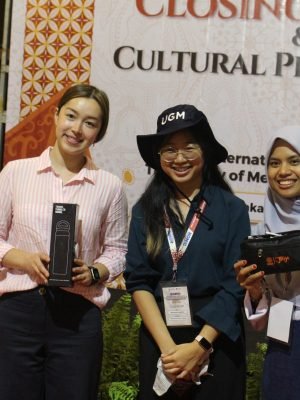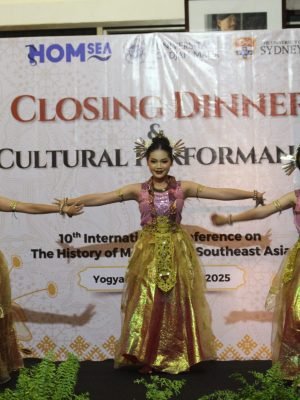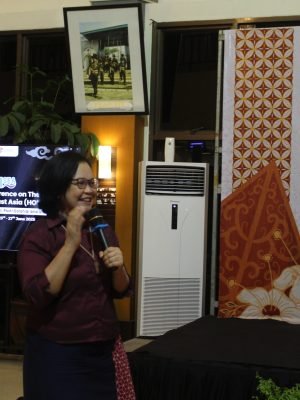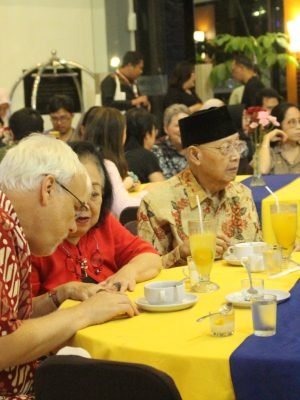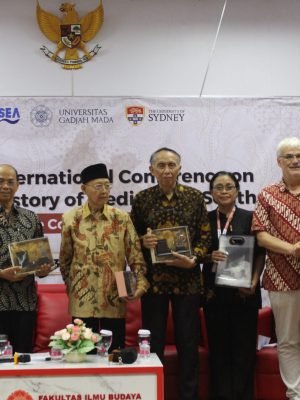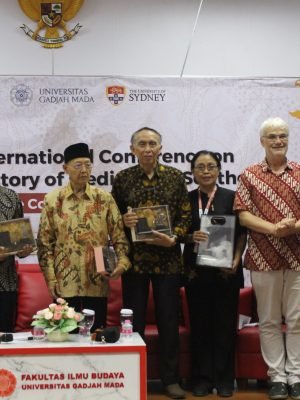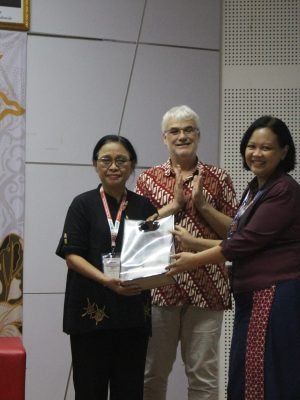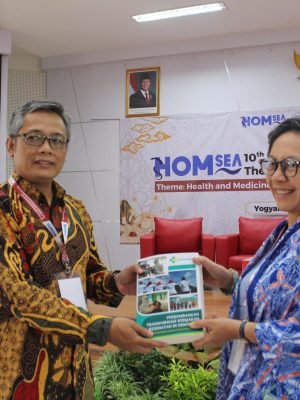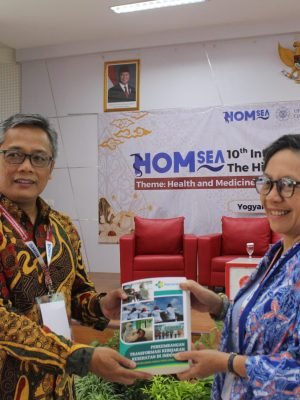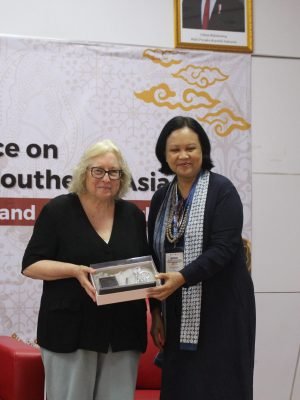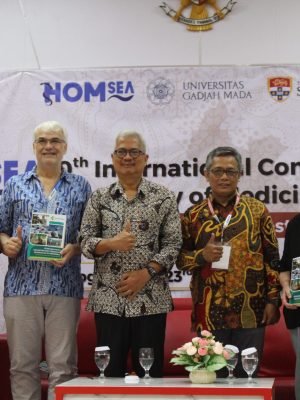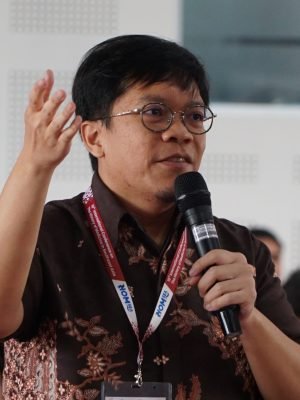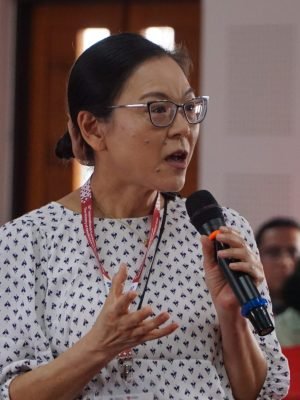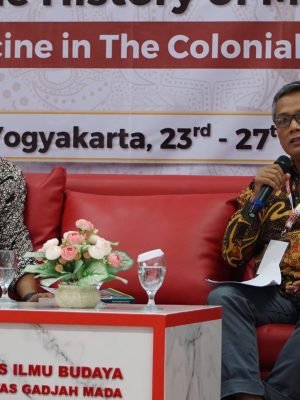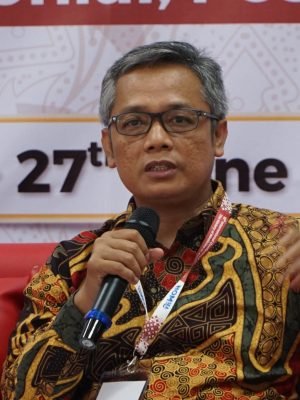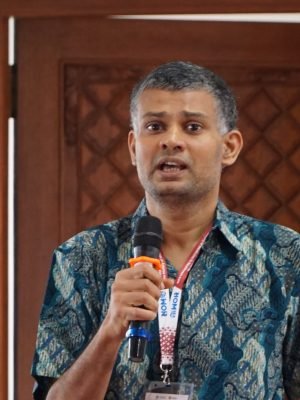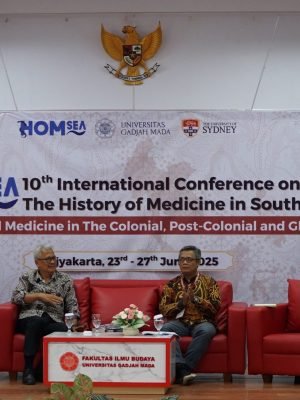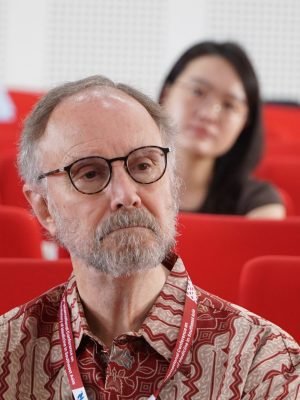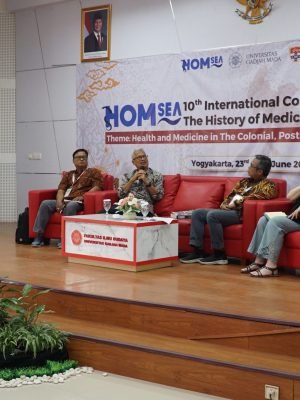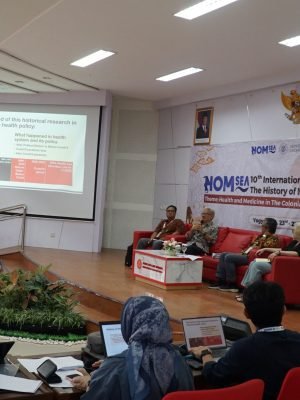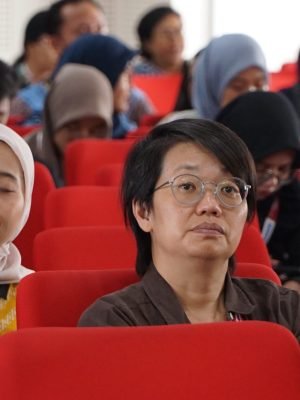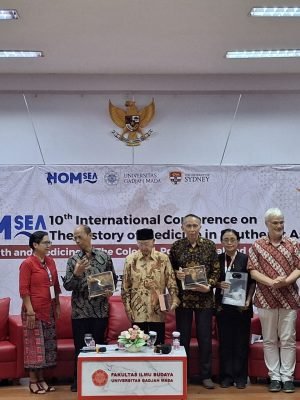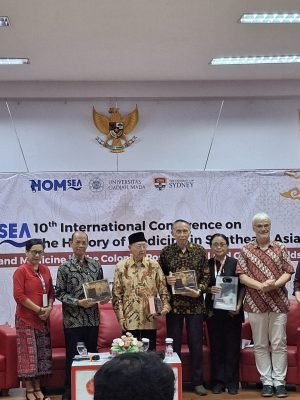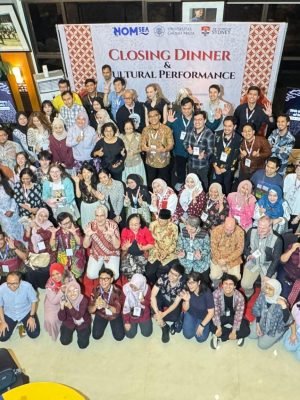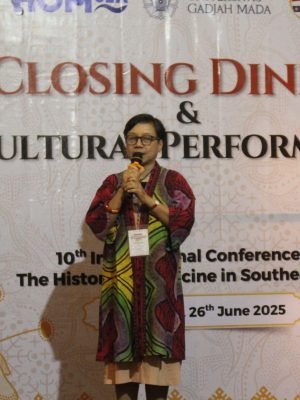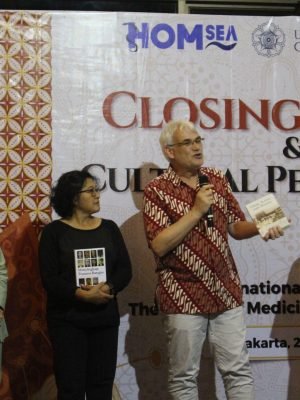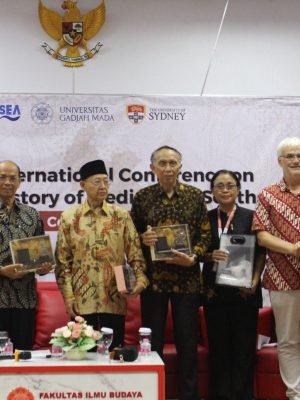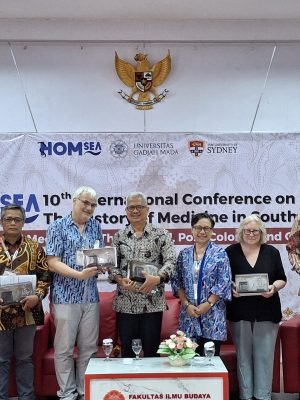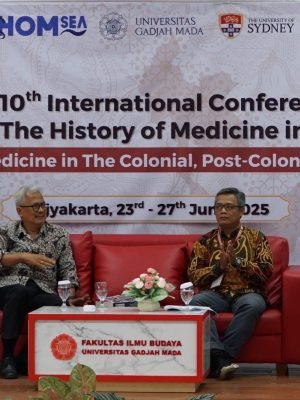
Report
HOMSEA
10TH INTERNATIONAL CONFERENCE ON THE HISTORY OF MEDICINE IN SOUTHEAST ASIA:
Health and Medicine in the Colonial, Post-Colonial and Global Worlds
23rd - 27th June 2025
Universitas Gadjah Mada Yogyakarta
Yogyakarta-UGM. On this occasion, the History Team from PKMK FK-KMK UGM and the History Department of FIB UGM were represented by Prof. Laksono Trisnantoro, Bahauddin, and Abdul Wahid. The event was held at Soegondo Building, 7 Floor, Faculty of Cultural Sciences, Universitas Gadjah Mada (UGM), located in the Special Region of Yogyakarta, Indonesia. The Opening Ceremony was held on Tuesday (24/6/2025). HOMSEA (History of Medicine in Southeast Asia) was founded by Prof Laurence Monnais (University of Montreal) and Dr. Rethy Chhem (former Executive Director of the Cambodia Development Resource Institute (CDRI)) in 2005, with the aim of promoting research in all aspects of the history of health and medicine in Southeast Asia. HOMSEA focuses on this region for several reasons: it has had a very diverse colonial history (the British, American, French and Dutch colonial empires all played a part); both in the past and in the present, its constituent parts faced (and continue to face) similar health challenges while the responses to these are highly variable.
HOMSEA aims to reach this goal by fostering closer contact among medical historians originating from the global North and those from the region. It also aims to foster greater cooperation among scholars, students, and physicians, especially those practicing in the region, by providing a forum for the international exchange of ideas and research. HOMSEA’s main activity is organising a conference on the history of health and medicine in Southeast Asia every two years, usually in cooperation with other societies.
The 10th HOMSEA International Conference has the main theme of “Health and Medicine in The Colonial, Post Colonial and Global Worlds” with the following sub-themes: 1) Health, Medicine and Decolonization, 2) Community Health VC Medical Specialization, 3) Connections and Differences Within Southeast Asia, 4)The Anthropocene from Southeast Asia Perspective, 5) Medicine, Ethis, Politics and The Sustainable Development Goals, and 6) Climate Change and Environmental Degradation.
At the opening ceremony of the 10th HOMSEA at FIB UGM this morning, several speeches were delivered by figures involved in making this event a success. In her speech, Prof. Dra. Yayi Suryo Prabandari, MSi, PhD, Head of the HOMSEA Local Arrangement Committee, said It is both an honor and a pleasure to welcome all participant to the 10th International Conference on the History of Medicine in Southeast Asia (HOMSEA), here in Yogyakarta, Indonesia. As Chair of this year's conference, “I am humbled by your presence and excited for the rich exchanges we are about to embark on over the coming days. This 10th edition of HOMSEA marks an important milestone—a decade of scholarly gatherings that have brought to light the diverse and complex histories of medicine across Southeast Asia. From colonial encounters to indigenous healing, from the evolution of public health policies to the role of gender, religion, and traditional knowledge— this forum has continually deepened our understanding of medicine as a cultural, political, and scientific phenomenon. This year, we gather in Yogyakarta, a city long associated with intellectual vigor, cultural richness, and historical depth. It is also home to Gadjah Mada University (UGM)—a university deeply rooted in the post-independence aspirations of Indonesia. The Faculty of Medicine, Public Health, and Nursing (FK-KMK UGM), established in 1949, stands as a testament to Indonesia's early commitment to develop a health system grounded in national resilience and scientific progress. The history of medicine in Indonesia reflects the intersections of colonial legacies, nationalist movements, transnational exchanges, and local knowledge systems. From the early days of STOVIA in Batavia to the community-based health reforms of the 20th century, medical practice in this archipelago has always been more than a clinical pursuit—it is a mirror of societal change and cultural adaptation. At HOMSEA 2025, we hope to build on these rich narratives. We invite you to engage critically with historical sources, revisit forgotten voices, and push the boundaries of interdisciplinary research. This conference is not only about preserving the past, but also about understanding how historical perspectives can inform ethical, educational, and policy decisions in our current and future healthcare systems. I would like to extend my sincere gratitude to our academic partners, institutional supporters, and the organizing team whose dedication made this event possible. I also thank you for bringing your scholarship, curiosity, and commitment to the field.”
Prof. Hans Pols, Ph.D., FAHA, FASSA, RSN, as President of HOMSEA, said that HOMSEA event was first held in Indonesia, specifically in Solo (2012). Then it was held at the National Library in Jakarta (2018). And this year the committee held it again in Indonesia, specifically in Yogyakarta. Yogyakarta occupies a special place with respect to the history of medicine in Indonesia. One of the first missionary hospitals on Java - the Bethesda hospital, was founded in 1901 and was the first hospital to provide health care to Indonesians. The Dr. Yap Eye Hospital was founded as a charitable initiative by the local Chinese-Indonesian community in 1919. Across the road is the Panti Rapih Catholic hospital. In 1924, the Muslim organisation Muhammadyah established a hospital too, which opened clinics and hospitals all over Eastern Java. For Indonesians, the Soeradji Tirtonegoro hospital in nearby Klaten occupies a special place. When the Dutch made Jakarta unsafe in 1946, medical education moved to this hospital, where it resumed under the guidance of Dr. Sardjito, in 1949 the founding president of Gadjah Mada University. I hope that we will have a wonderful conference in a city that has been so important in the history of medicine in Indonesia.
Prof. Dr. Setiadi, S.Sos., M.Si as Dean, Faculty of Cultural Sciences, UGM explained exploring the historical medicine dimension in SouthEast Asia. Historical medicine is not only clinical but also culturally involved social structure, culture, Politics, Science and any other aspects. use this opportunity not only to present the paper but also to build connections and collaborations between the knowledge. He expressed his gratitude for the collaborative spirit that characterizes this conference. Through such interdisciplinary and transnational dialogue, we can continue to uncover our shared history, confront controversial narratives, and build a richer and more inclusive understanding of Southeast Asia's medical past. In closing, Prof. Setiadi urged participants to take advantage of this opportunity not only to share research but also to build relationships that transcend national borders and academic disciplines. May this conference provide intellectual benefits and strengthen our collective commitment to preserving and interpreting the diverse medical heritage of our region.
Prof. dr. Yodi Mahendradhata, MSc, PhD, FRSPH as Dean Faculty of Medicine, Public Health, and Nursing, UGM said the timeless message which was quoted from Soekarno “never forget the History” not to look back to the past but to look up to the future. Our institution was born in the early days of Indonesia’s independence day. This conference honored our history. It is not only clinical aspects but also social political aspects. In his closing, he would like to thank the committee, speakers, and participants for their dedication to advancing the field of medical history. May this conference inspire new research, strengthen ongoing academic networks, and highlight the important role of historical inquiry in public health, medical ethics, and medical education.
Prof. dr. Ova Emilia, MMedED, SpOG(K), PhD. as chancellors UGM explained reflecting the historical foundation in South East Asia, scholarly innovation among the participants. How medical knowledge has an impact in South East Asia. Ensuring the contribution of SouthEast Asia in the History of Medicine. She emphasized that understanding the history of medicine is not merely an academic endeavor. It is a necessary lens for interpreting the social, cultural, and political dimensions of health. Amidst public health crises and global transformations, a historical perspective provides the wisdom to contextualize current challenges and guide future policies rooted in empathy, justice, and cultural awareness. This conference is designed as a platform to encourage critical reflection, academic innovation, and collaborative exploration among participants from various disciplines. Through papers, panels, and discussions, we hope to deepen our collective understanding of how medical knowledge is produced, debated, and practiced in the context of Southeast Asia.
Furthermore, as global health becomes increasingly interconnected, there is an urgent need to ground our responses in perspectives rooted in culture and history. HOMSEA’s commitment to highlighting local narratives and regional connections is crucial in ensuring that Southeast Asian experiences contribute meaningfully to global conversations about health and medicine. As a closing remark, Prof. Ova urged participants to begin this conference with curiosity, humility, and a shared commitment to developing knowledge that respects our past and our responsibility toward the future. She hopes that the discussions held over the coming days will spark new questions, foster ongoing collaboration, and deepen appreciation for the complexity and richness of medical history in our region. Thank you, and may this conference be productive and inspiring for all. After speeches by several dignitaries, the opening ceremony of the HOMSEA International Conference continued with the striking of a gong (Gamelan Jawa) as a symbolic sign of the opening of the event.
Readmore :
https://sejarahkesehatan.net/history-of-medicine-in-southeast-asia-homsea-conference/
Reporter:
Aulia Putri Hijriyah, S.Sej.,
Daranindra A. Prameswari, S.Sej.,
HOMSEA
10TH INTERNATIONAL CONFERENCE ON THE HISTORY OF MEDICINE IN SOUTHEAST ASIA:
Health and Medicine in the Colonial, Post-Colonial, and Global Worlds
23rd - 27th June 2025
UGM-Yogyakarta. As part of the 10th International Conference on the History of Medicine in Southeast Asia (HOMSEA), a thematic session titled "Health and Medicine in the Colonial, Post-Colonial, and Global Worlds" was held on June 26, 2025, on the 7th floor of the Soegondo Building, Faculty of Cultural Sciences, Universitas Gadjah Mada (UGM). On this occasion, the History Team from PKMK FK-KMK UGM and the History Department of FIB UGM participated in the HOMSEA 2025 Plenary Symposium. This activity was part of the Closing Ceremony of the 10th HOMSEA, held on Thursday (June 26, 2025). In this Plenary Symposium, there were two main speakers, namely Prof. Dr. Menaldi Rasmin, Sp.P(K), FISR, FCCP, and Prof. Dr. dr. Hardyanto Soebono, Sp.D.V.E, Subsp.D.T. The discussion continued with Prof. Budi Mulyono, former Director General of Sardjito General Hospital (2009-2012), followed by Prof. Soenarto Sastro Wijoto, former Dean of the Faculty of Medicine at UGM (1991-1997), and Dr. Slamet Riyadi Yuwono, former Director of Dr. Soetomo General Hospital (2003-2011).
 Prof. Dr. Menaldi Rasmin, Sp.P(K), FISR, FCCP spoke about the History of Medical Education in Indonesia. The history of medical education in Indonesia began with the establishment of the Doctor Java School (Sekolah Dokter Djawa) in 1851, initiated by Dr. Willem Bosch under a government decree. The initial intake consisted of 12 students from noble families, with instruction in Malay and a curriculum covering 17 subjects. Over time, the school expanded its curriculum and tightened admission requirements, eventually recognizing its graduates as "native doctors." In 1901, the institution evolved into STOVIA (School tot Opleiding van Indische Artsen), extending the education period to nine years and awarding the title Indische Arts. By 1913, the NIAS (Nederlands Indische Artsen School) was established in Surabaya to address the need for doctors in eastern Indonesia, following a similar curriculum to STOVIA.
Prof. Dr. Menaldi Rasmin, Sp.P(K), FISR, FCCP spoke about the History of Medical Education in Indonesia. The history of medical education in Indonesia began with the establishment of the Doctor Java School (Sekolah Dokter Djawa) in 1851, initiated by Dr. Willem Bosch under a government decree. The initial intake consisted of 12 students from noble families, with instruction in Malay and a curriculum covering 17 subjects. Over time, the school expanded its curriculum and tightened admission requirements, eventually recognizing its graduates as "native doctors." In 1901, the institution evolved into STOVIA (School tot Opleiding van Indische Artsen), extending the education period to nine years and awarding the title Indische Arts. By 1913, the NIAS (Nederlands Indische Artsen School) was established in Surabaya to address the need for doctors in eastern Indonesia, following a similar curriculum to STOVIA.
In 1927, the Geneeskundige Hoogeschool (GH) was founded in Batavia, marking the transition to university-level medical education with a curriculum aligned with Dutch standards. During the Japanese occupation in 1942, GH and NIAS were closed but later reopened as Ika Dai Gaku, with instruction in Indonesian and a shortened education period due to wartime needs. Following Indonesia's independence, the "Pergoeroean Tinggi Kedokteran (PTK)" was established, eventually forming the basis for the medical faculties at the University of Indonesia, Gadjah Mada University, and Airlangga University.
Post-independence, the education system shifted from a free study model to a guided study approach, emphasizing discipline and measurable outcomes. The curriculum continued to evolve, leading to the implementation of the Indonesia Medical Education Core Curriculum (KIPDI) in 1982 and the Competency-Based Curriculum (KBK) in 2004. Modern medical education in Indonesia now emphasizes integration across biomedical, clinical, and community medicine, active learning methods such as Problem-Based Learning (PBL), and alignment with global standards. Admission is highly selective, and graduates must complete both academic and professional stages, including an internship, to become licensed doctors.
 Prof. Dr. dr. Hardyanto Soebono, Sp.D.V.E, Subsp.D.T, formerly served as Dean of the Faculty of Medicine, Public Health, and Nursing at Gadjah Mada University (UGM). On this occasion, Prof. Hardyanto presented on the history of medical education, with a particular focus on the Faculty of Medicine at Gadjah Mada University (UGM). The history of medical education at the University of Gadjah Mada (UGM) reflects the broader development of medical schools in Indonesia. It began with the establishment of the Java Medical School in 1851, followed by STOVIA in 1901 and NIAS in 1913, which laid the foundation for formal medical training in the country. The Geneeskundige Hogeschool was established in 1927, and during the Japanese occupation, the school operated as Ika Dai Gaku. After Indonesia's independence, the medical school was moved to Klaten in 1946 due to security issues in Jakarta, marking the birth of the Faculty of Medicine at UGM. The institution later moved to Yogyakarta and became part of the newly established Gadjah Mada University in 1949.
Prof. Dr. dr. Hardyanto Soebono, Sp.D.V.E, Subsp.D.T, formerly served as Dean of the Faculty of Medicine, Public Health, and Nursing at Gadjah Mada University (UGM). On this occasion, Prof. Hardyanto presented on the history of medical education, with a particular focus on the Faculty of Medicine at Gadjah Mada University (UGM). The history of medical education at the University of Gadjah Mada (UGM) reflects the broader development of medical schools in Indonesia. It began with the establishment of the Java Medical School in 1851, followed by STOVIA in 1901 and NIAS in 1913, which laid the foundation for formal medical training in the country. The Geneeskundige Hogeschool was established in 1927, and during the Japanese occupation, the school operated as Ika Dai Gaku. After Indonesia's independence, the medical school was moved to Klaten in 1946 due to security issues in Jakarta, marking the birth of the Faculty of Medicine at UGM. The institution later moved to Yogyakarta and became part of the newly established Gadjah Mada University in 1949.
Over the decades, the faculty has undergone significant changes, including campus relocations, curriculum reforms, and academic program expansions. The implementation of a credit system and problem-based learning in the late 20th century marked the modernization of medical education at UGM. Today, the faculty offers various undergraduate and graduate programs and plays a central role in developing medical education and healthcare services in Indonesia.
The presentation continued by explaining the structure and roles of several hospitals affiliated with UGM, including Sardjito Hospital, Suradji Tirtonegoro Hospital, UGM Hospital, Hardjolukito Hospital, and Banyumas Hospital. Each institution was noted for its specialized services and contributions to education and public health. Prof. Budi Mulyono concluded by emphasizing the importance of ongoing integration and collaboration between educational, clinical, and research institutions to achieve excellence in medical education and healthcare services in Indonesia. Prof. Dr. dr. Soenarto Sastro Wijoto, SpTHT(K), a former Dean of the Faculty of Medicine at UGM (1991-1997), took this opportunity to revisit the history and development of the Faculty of Medicine at Gadjah Mada University (UGM), highlighting its origins during the struggle in Klaten (1940-1949), followed by its relocation to Mangkubumen and Sekip, and its growth into a leading institution in medical education and research in Indonesia. Prof. Soenarto emphasized the faculty's strong tradition of collaboration, both nationally and internationally, through partnerships with other faculties, hospitals, and global medical schools, as well as its commitment to improving public health, medical education, and research. In this session, Prof. Soenarto concluded his discussion by stressing the importance of sustained international networks and collaboration to strengthen medical education and healthcare services in the future.
Dr. dr. Slamet Riyadi Yuwono, DTM&H, MARS, a former Director of Dr. Soetomo General Hospital (2003-2011), discussed the evolution and current state of medical education in Surabaya, particularly at Airlangga University, as well as the management and future direction of teaching hospitals. He outlined the historical milestones of medical education in Surabaya, from the establishment of NIAS in 1913 to the current Faculty of Medicine at Airlangga University, which now offers 25 specialty programs. Dr. Yuwono emphasized that teaching hospitals have three main roles: providing patient care, educating medical students and residents, and conducting research. He highlighted the importance of synchronization between hospital staff and faculty staff to ensure quality, safety, and satisfaction in patient care and education. The presentation also discussed the importance of accreditation and the integration of resources, infrastructure, and guidelines to support effective educational and healthcare services. Looking toward the future, Dr. Yuwono advocated for the implementation of the Academic Health System (AHS), aimed at synergizing the national education and healthcare systems, enhancing educational and research productivity, and ultimately improving public health outcomes such as life expectancy, disease incidence, and access to healthcare facilities.
Readmore :
https://sejarahkesehatan.net/history-of-medicine-in-southeast-asia-homsea-conference/
Reporter:
Aulia Putri Hijriyah, S.Sej.,
Galen Sousan Amory, S.Sej.,
HOMSEA
10TH INTERNATIONAL CONFERENCE ON THE HISTORY OF MEDICINE IN SOUTHEAST ASIA:
Health and Medicine in the Colonial, Post-Colonial, and Global Worlds
23rd - 27th June 2025

Yogyakarta-UGM. On this occasion, the History Team from PKMK FK-KMK UGM and the Department of History FIB UGM, represented by Bahauddin, Aulia, and Galen, attended the Closing Dinner and Cultural Performance event. This event was held at the MM UGM Hotel located in the Special Region of Yogyakarta, Indonesia. The Closing Dinner and Cultural Performance took place on Thursday, June 26, 2025. The 10th HOMSEA International Conference, with the main theme "Health and Medicine in the Colonial, Post-Colonial, and Global Worlds, " began on Monday, June 23, 2025 , with the opening ceremony on Tuesday, June 24, 2025. This event was attended by participants from various countries in both Asia and Europe. Even participants from Indonesia were spread across various regions. The event featured multiple seminar discussions that aligned with this year's theme and sub-themes. For the dinner, the HOMSEA organizing committee collaborated with the MM UGM Hotel to serve traditional Indonesian dishes or regional specialties to guests, especially to introduce Indonesian cuisine to foreign participants. For example, "tahu kukus" and "ikan goreng bumbu kuning," followed by "dawet" or "es cendol."
 At the closing ceremony of HOMSEA, Prof. Dra. Yayi Suryo Prabandari, MSi, PhD, as the Chairperson of the HOMSEA Local Arrangement Committee, expressed gratitude to all the committee members who had served, to all participants who had come to Yogyakarta from various countries and cities in Indonesia. Prof. Yayi also thanked Prof. Hans Pols , the President of HOMSEA, for his cooperation and collaboration in preparing this event. He did not forget to acknowledge the parties who had contributed to the success of this event , from FIB UGM, the Department of History FIB UGM, and all parties who could not be mentioned individually . On this occasion, Prof. Yayi mentioned that tomorrow there would still be a closing activity, namely the Hospital Tour in Yogyakarta and its surroundings. Hopefully, this tour activity can provide a more in-depth introduction to the history of hospitals .
At the closing ceremony of HOMSEA, Prof. Dra. Yayi Suryo Prabandari, MSi, PhD, as the Chairperson of the HOMSEA Local Arrangement Committee, expressed gratitude to all the committee members who had served, to all participants who had come to Yogyakarta from various countries and cities in Indonesia. Prof. Yayi also thanked Prof. Hans Pols , the President of HOMSEA, for his cooperation and collaboration in preparing this event. He did not forget to acknowledge the parties who had contributed to the success of this event , from FIB UGM, the Department of History FIB UGM, and all parties who could not be mentioned individually . On this occasion, Prof. Yayi mentioned that tomorrow there would still be a closing activity, namely the Hospital Tour in Yogyakarta and its surroundings. Hopefully, this tour activity can provide a more in-depth introduction to the history of hospitals .
 Furthermore, Prof. Hans Pols , as President of HOMSEA, expressed his gratitude to all parties at UGM for their assistance in preparing and successfully executing this international conference . The event continued with the launch of the latest book by Prof. Hans , entitled "Drugs, Science, and Power: History of Health and Medicine in Indonesia," which was launched in collaboration with KOMPAS in Jakarta.
Furthermore, Prof. Hans Pols , as President of HOMSEA, expressed his gratitude to all parties at UGM for their assistance in preparing and successfully executing this international conference . The event continued with the launch of the latest book by Prof. Hans , entitled "Drugs, Science, and Power: History of Health and Medicine in Indonesia," which was launched in collaboration with KOMPAS in Jakarta.
The event concluded with a traditional dance performance from UGM Faculty of Cultural Sciences students and exciting games guided by the MC. This was followed by a photo session with all committee members on duty, participants , and invited guests. Read more:
https://sejarahkesehatan.net/history-of-medicine-in-southeast-asia-homsea-conference/
Reporter:
Aulia Putri Hijriyah, S.Sej.,
Galen Sousan Amory, S.Sej.
HOMSEA (History of Medicine in Southeast Asia) was founded by Prof Laurence Monnais (University of Montreal) and Dr. Rethy Chhem (former Executive Director of the Cambodia Development Resource Institute (CDRI)) in 2005, with the aim of promoting research in all aspects of the history of health and medicine in Southeast Asia. HOMSEA focuses on this region for several reasons: it has had a very diverse colonial history (the British, American, French and Dutch colonial empires all played a part); both in the past and in the present, its constituent parts faced (and continue to face) similar health challenges while the responses to these are highly variable.
HOMSEA aims to reach this goal by fostering closer contact among medical historians originating from the global North and those from the region. It also aims to foster greater cooperation among scholars, students, and physicians, especially those practicing in the region, by providing a forum for the international exchange of ideas and research.
HOMSEA’s main activity is organising a conference on the history of health and medicine in Southeast Asia every two years, usually in cooperation with other societies. Over the past few years, the COVID pandemic and social unrest has interfered in reaching this aim.
To realise its goal to bring scholars from Southeast Asia in contact with scholars from the global North, the organisers of the HOMSEA conferences realised that they needed to subsidise the participation of scholars from countries such as Cambodia, Indonesia, Laos, and Vietnam. It has therefore made travel bursaries available for all meetings, which include a waived conference fee. These bursaries have been funded through the Canada Research Chair in Healthcare Pluralism (Prof Laurence Monnais); the Royal Netherlands Institute of Southeast Asian and Caribbean Studies, Leiden, The Netherlands (KITLV, through Prof Peter Boomgaard); The Sydney Southeast Asia Centre (through Profs. Warwick Anderson and Hans Pols); and several other sources.
- Founding conference: Siem Reap, 2006
- Penang, Malaysia, 2008
- Singapore, 2010 (with International Association of Historians of Asia)
- Solo, Indonesia, 2012 (with the Indonesian Association of the History of Medicine PERSEKIN)
- Manila, The Philippines, 2014
- Siem Riep, Cambodia (10th anniversary meeting), 2016
- Vientiane, Laos, 2018 First Joint Meeting of HOMSEA and the Asian Society of the History of Medicine Jakarta, Indonesia, 2018 (in association the Indonesian Academy of Sciences (AIPI) and the Indonesian National Library (PNRI)
- Hong Kong, 2020, hosted by the University of Hong Kong (meeting cancelled at the last minute because of political unrest in Hong Kong)
- Singapore, 2023, hosted by Nanyang Technological University
BURSARY PROGRAM HOMSEA has supported around 15-20 young scholars-graduate students LMIC in SEA on average in the past. Since our first meeting, it has been part of our signature and reason for success over the years. Individual support has been between US$300 and US$500, depending on the cost of transportation and accommodation at the site of the conference. Formal requests for support have to be submitted along with the abstract submission.
In 2018 (meeting in Vientiane, Laos), we distributed US$ 6,000 in funding; Singapore is much more expensive than Laos. We distributed around US$10,000. There are several possible sources for this funding. First, part of the registration fees for attendants from High-Income countries subsidise these bursaries. Second, there have been times that the host University was able to provide some funding. Third, in the past, we have successfully sought funding from other sources.
| Submission Deadline Abstract | : 31 December 2024 |
| Open Registration | : 27 February 2025 |
Registration for HOMSEA 2025 remains open until the day of the event, so don't miss your chance to join!
All sessions are on the 7th floor of the Soegondo Building, Faculty of Cultural Science, Universitas Gadjah Mada
- Call for participants’ abstracts submission
- 1 day pre-conference workshop
- 3 days conference:
○ Plenary keynote speakers
○ Plenary symposium sessions
○ Parallel oral presentation - 1 day excursion
- Health, Medicine and Decolonization
- Community Health VS Medical Specialization
- Connections and differences within Southeast Asia
- The Anthropocene from Southeast Asia Perspective
- Medicine, Ethics, Politics and the Sustainable Development Goals
- Climate Change and Environmental Degradation
PROGRAM
Registration Information
Monday 23 June
There are many museums you could visit on the Monday morning, for example:
| |
| 13.30 | Registration |
| 14.00 | Opening |
14.00 – 16.00
| Pre-Conference Workshop Soegondo 709 |
Getting Published in the History of Asian Medicine Workshop led by Prof Pierce Salguero Pennsylvania State University at Abington, USA Free. Registration required. | |
| 16.00 | Closing |
| Informal get-together at local green café Podocarpus by Moikai | |
Tuesday 24 June
8.00 – 8.30 | Registration | ||
8.30 – 9.00 | Opening Ceremony Auditorium | Prof Dra. Yayi Suryo Prabandari, MSi, PhD Head, HOMSEA Local Arrangement Committee Prof Hans Pols, PHD FAHA FASSA RSN President HOMSEA Prof. Dr. Setiadi, SSos, MSi Dean, Faculty of Cultural Sciences, UGM Prof dr Yodi Mahendradhata, MSc, PhD, FRSPH Dean Faculty of Medicine, Public Health, and Nursing, UGM Prof dr Ova Emilia, MMedEd, SpOG(K), PhD Rektor UGM | |
9.00 – 10.00 | KEYNOTE Auditorium | ||
| Southeast Asia as the Source for European Books on the Medicine of China Prof. Harold J. Cook Brown University, USA | ||
10.00 – 10.30 | Coffee / Tea | ||
10.30 – 12.30 | PARALLEL PANELS | ||
| 1. Traditional Medicine in Southeast Asia, I Soegondo Auditorium | 2. Health and Medicine on Plantations and in Industry Soegondo 707 | |
Bridging Traditions: The Integration of Eastern and Western Medicine in French Colonial Vietnam (1900 – 1945) Mai Thi My Vi National Cheng Kung University, Taiwan | Dutch Imperialism and Metabolic Rift: The Rise of Plantation Belt on The East Coast of Sumatra, 1870s-1930s Devi Itawan & Bahagia Raharjo Universitas Jambi, ID; U Diponegoro, ID | ||
Āyurveda and Traditional Healing Practices in Southeast Asian Buddhist Cultures Arun Kumar Yadav Banaras Hindu University, India | Making Homes for the “Decrepit”: Disabled Coolies, Labor Management and Healthcare in British Malaya (1850-1930) Zhiqing Chen Northwestern University, USA | ||
Healing Spirits: The Medicinal Benefits of Local Liquors in Southeast Asian Traditional Medicine Piyakasidet Plueaisri Chulalongkorn University, Thailand | The 1930s Economic Crisis and its Impact on Disease Trends and Health Services on the Plantations of East Sumatra and Surakarta Wasino & Endah Sri Hartatik Univ. Negeri Semarang, Uni Diponegoro, ID | ||
Utilisation Patterns of Traditional Medicine among Hmong Ethnic Minority People in Northern Vietnam Le Nguyen Vietnam Academy of Social Sciences | The Nickel Mining Industry in Sulawesi: Historical Context, Environmental Impact, and Health Consequences (1966-present) Adi Setiawan Universitas Gadjah Mada, ID | ||
10.30 – 12.30 | 3. Pioneers and Trendsetters in Health and Medicine Soegondo 721 | 4. Palliative Care
Soegondo 709 | |
| Wilhelm August Paul Schuffner: The Doctor who Eradicated Malaria in Sumatra Junaidi, Muhammad Rasyidin, and Kiki Maulana Affandi Universitas Sumatera Utara, ID | Palliative Care and Pain Management: Health Practitioner and Community Perspectives from Denpasar, Bali Elisabeth Kramer University of New South Wales, Australia | |
Dr Marie Thomas and Dr Honoria Acosta-Sison: Pioneers of Women’s Health in Indonesia and the Philippines Sudirman Nasir Universitas Hasanuddin, ID | The Development of Palliative Care in Indonesia and Current Challenges Christantie Effendy Universitas Gadjah Mada, ID
| ||
A Key Figure: Introduction of Prof. M. Sardjito MD, MPH Rudi Pekerti and Rushdy Hoesein Indonesian Association of the History of Medicine (PERSEKIN), ID | Caring on the Margins: Community-Led Palliative Care for the Estranged in a Care System Built on Family Responsibility Lintang Sagoro SM Medika Clinic, Jakarta, ID | ||
Sulianti Saroso and the Idea of Community Health in Indonesia (1950-1980) Syarifah Aini Universitas Gajah Mada, ID | Home Palliative Care in Indonesia: Reflections on Current Practices, Local Wisdom, and Religious Values Bagas Wicaksono University of Amsterdam, NL | ||
A Living Legend: The Founder Indonesian Department and Collegium of Digestive Surgery, Prof. Dr. Sjamsuhidajat SpKBD Rudi Pekerti Indonesian Association of the History of Medicine (PERSEKIN), ID | Reshaping Medical Specialization Through Life Stories: A Case Study of Co-Designed Palliative Care in Suburban Thailand Chutchon Ajanakitti & Natnaree Chonsathean Institute for Social Health, Thailand | ||
12.30 – 13.30 | LUNCH BREAK: EAT & PREY | ||
13.30 – 15.30 | PARALLEL PANELS | ||
| 5. Traditional Medicine in Southeast Asia, II Soegondo Auditorium | 6. The Organization of Health Care
Soegondo 707 | |
The Development, Research, Education, and Utilization of Jamu by Physicians in Post-Independence Indonesia Inggrid Tania Chair of PDPOTJI (Ind Medical Ass for the Development of Traditional Medicine) | R.K. Carolus Ziekenhuis: The Manifestation of the Modern Hospital in the Netherlands East Indies Dewik Untarawati Universitas Jember, ID | ||
The Official Herbalisation of Jamu Tsung-Jen Hung University of Sydney, Australia | Fill the Gap: Development of Healthcare Facilities in Sarawak After 15 Years of Independence Suffian Mansor Universiti Kebangsaan Malaysia, Malaysia | ||
Making Jamu Exciting Again: A case for Safeguarding Jamu Traditions in Singapore Suryakenchana Omar Javanese Association of Singapore, Society of Malay Heritage Medicine, Singapore | Yogyakarta’s Petronella (Bethesda) Hospital as Model for Health Care in the Dutch East Indies Sari Mutia Timur RS Bethesda, Yogyakarta | ||
The Making of Waria Subjectivity through Jamu Samantha Baker University of Sydney, Australia | The Relation between Zendingziekenhuis Petronella and Yogyakarta’s Sugar Industry Aga Yurista Pambayun Roemahtoea Urban Archeology, Yogyakarta | ||
Buddhist Healing in the Lanna Region of Northern Thailand Pierce Salguero Pennsylvania State Univ. at Abington, USA
| Weaving MAPS: A Historiography on Writing Postcolonial Histories of Colonial Hospitals Joseph A. S. Joe Johns Hopkins University, USA | ||
13.30 – 15.30 | 7. Leprosy Soegondo 721 | 8. Traumatic Pasts in Indonesia Soegondo 709 | |
| The Face of Colonies in Southeast Asia: Public Health Policies and Actions in the 19th-20th Century Moordiati Universitas Airlangga, ID | Introduction E.S. Tyas Suci Atma Jaya University, Jakarta, ID Hans Pols University of Sydney, Australia | |
Healthcare on Trains in the Indies in the 1910s: On the Case of the Disinfection Wagon for Bubonic Plague Eradication and Leprosy Patients Transportation Muhammad Rizky Pradana Universitas Airlangga, ID | Painting from the Margins Dewi Candraningrum Jejer Wadon Solo
| ||
“I am a Leper, Are You also Afraid of Me?”: Donorojo and the Care for Leprosy Patients in Java, A Preliminary Study Ravando Universitas Gadjah Mada, ID | The May 1998 Riots and the Emergence of Trauma in the Indonesian Media Hans Pols University of Sydney, Australia | ||
“Aku sakti”: Cultural Perspectives on Leprosy in East Java, Indonesia Toetik Koesbardiati, Delta Bayu Murti, Rizky Putri Sugianto Universitas Airlangga, ID | Echoes of Trauma: Unravelling Social Conflict in the Heart of Maluku E.S. Tyas Suci Atma Jaya University, Jakarta, ID | ||
| Book launch: Tyas Suci & Hans Pols, eds., Menyingkap Trauma Bangsa: Luka Sejarah Indonesia dan Jalan Menuju Pemulihan Jiwa (KOMPAS, 2025).
| ||
15.30 – 16.00 | COFFEE / TEA | ||
16.00 – 17.30 | PARALLEL PANELS | ||
| 9. Traditional Medicine in Southeast Asia, III Soegondo Auditorium | 10. Marriage, Families, and Children
Soegondo 707 | |
Health and Beauty for Javanese Women: The Contributions of R.A.H. Soejono in the Late Colonial Era, 1939–1941 Amanda Lathifah Laksmana Putri, Levi Nur Cahyani & Adzka Fatiyah Universitas Indonesia, ID | Making Healers at Home: Pedagogy of Cure and Care in Late Colonial Indonesia Nik Setiadarma Northwestern University, USA | ||
| The Potential of Rural Health and Wellbeing Tourism through Traditional Herbs among the Tais of Northeast India Shiladitya Basu Chulalongkorn University, Thailand | How to Have Sex with Dignity: Navigating Modernity in Indonesian Sex Manuals (1950-1965) Rima Febriani Monash University, Australia | |
The Effectiveness of Traditional Medicine on Women’s Reproductive Health in Contemporary Malay Society Fakhriati BRIN, ID | Planning Families for Developing Indonesia? Japan’s Medical Diplomacy for Indonesia’s Family Planning, 1970s-80s Aya Homei University of Manchester, UK | ||
Discussion and Commentary
Pierce Salguero Pennsylvania State University, USA | |||
16.00 – 17.30 | 11. Contagious Disease, I Soegondo 721 | 12. Vaccination and Public Health Soegondo 709 | |
| When Dogs Spread Disease: Rabies as an Epidemic and Colonial Policy in Early 20th Century Sumatra Albertus Hutagalung Andalas University, ID | An ‘Experiment’ with Vaccines? Collective Memory, Health Authority, and Vaccine Hesitancy in the Philippines Vincen Gregory Yu University of Sydney, Australia | |
The Railway Travel of Diseases in Colonial India Debashis Mandal Banwarilal Bhalotia College, India | The Fate of Colonial Era Vaccination Programs in Southeast Asia during the Early Cold War Period, c.1945-1949 C. Michele Thompson Southern Connecticut State University, USA | ||
|
| Colonial Medicine and Disease Ecology: Hong Kong as a Laboratory for Medicine Rachel Zicheng Yang University of Sydney, Australia | |
Wednesday 25 June
8.00 – 8.45 | Registration | ||
8.45 – 8.50 | Opening of Day 2, MC | ||
8.50 – 10.00 | KEYNOTE Auditorium Soegondo | ||
| A Critical Evaluation on the Role of Government in the National health Policy In Indonesia: From Reform to Post Covid-19, (1999-2023) Abdul Wahid, Baha’Uddin, and Laksono Trisnantoro Universitas Gadjah Mada, Indonesia
Book launch Abdul Wahid, Baha’Uddin, and Laksono Trisnantoro, eds. Perkembangan Transformasi Kebijakan Kesehatan di Indonesia: Dari Reformasi Hingga Pasca Covid, 1999-2023. | ||
10.00 – 10.30 | COFFEE / TEA | ||
10.30 – 12.30 | PARALLEL PANELS | ||
| 1. The Social Life of Plants: Histories of Health and Medicine in Southeast Asia Auditorium Soegondo | 2. Nutrition and Health Soegondo 707 | |
The temple’s garden: An ethnobotanical study of medicinal plant usage on Pulau Ubin Glenda Wee Yale-NUS College, Singapore | Tinkering Thiamine: Beriberi Treatment and the Making of Rice Bran Extracts in the American Philippines, 1910s–1930s Vincent Bernabe University of the Philippines Diliman, Philippines | ||
Palatable plants: School Gardens, Food Recipes and the Origins of Nutrition Science in the Philippines Ruel V. Pagunsan University of the Philippines-Diliman, Philippines | Colonial Nutrition Science Development: Diet and Nutrition in Malaya, 1930-1948 Muhammad Fahmie Rosle and Mohd Shazwan Mokhtar Universiti Kebangsaan Malaysia | ||
Where Traditional Medicine Meets Colonial Botany: A Digital Humanities Approach to Collecting Medicinal Plants for the Singapore Herbarium, 1920s Katherine Enright University of Cambridge, UK | The Role of Doctors in Overcoming Beriberi in Jambi in the 20th Century Ilma Universitas Gadjah Mada, Indonesia
| ||
‘Apotik Hijau’: The Medicinal Life of Plants in Indonesian Nationalism, 1930s-1960s Anthony D. Medrano National University of Singapore, Singapore | The Condensed Milk Controversy: Debating National Self-Sufficiency and Nutritional Security in 1960s Philippines Nicolo Paolo P. Ludovice Hong Kong University of Science and Technology, Hong Kong | ||
Discussion Anthony Medrano (organizer) National University of Singapore | Kader under the Health Metrics Regime in Indonesia’s Stunting Reduction Programs Sari D. Ratri & Marini Purnama Sari Monash University Indonesia | ||
10.30 – 12.30 | 3. Tuberculosis Soegondo 721 | 4. Public Health Soegondo 709 | |
| Tuberculosis and Famine: Correlating the Rise of Tuberculosis Post-Famine during the Japanese Occupation Era in Java 1942-1960 Satria Yudangara Universitas Jember, Indonesia | Thoughts of R.A. Kartini about Public Health on Java during the Colonial Period Karang Jimbaran Setyatrisila Universitas Negeri Yogyakarta, Indonesia | |
Unravelling Household Welfare Dynamics in Tuberculosis-Affected Families Salma Nur Annisa Universitas Padjajaran, Indonesia | Eugenics Discourse in the Dutch East Indies Tazkia K.S. Irsyad Universitas Padjadjaran, Indonesia | ||
Disease and Prejudice: A History of Stigma towards Tuberculosis Patients in Indonesia Martina Safitry UIN Raden Mas Said Surakarta, Indonesia | Western Medicine Propaganda in Padang, 1920s-1930s Nesa Okta Mirza Universitas Gadjah Mada, Indonesia
| ||
Controlling Tuberculosis in the Philippines: Global South Perspectives on Public Health and Policy (1950s–1980s) Arnab Chakraborty Shanghai University, China | Medical Hygiene Propaganda in the Dutch East Indies Yelda Syafrina Universitas Negeri Padang, Indonesia | ||
Hygiene as a Political Agenda: Sanitation for Natives and Environmental Issues in Colonial Surabaya Alfian Widi Santoso Independent Scholar | |||
12.30 – 13.30 | LUNCH BREAK: EAT AND PREY | ||
13.30 – 15.30 | PARALLEL PANELS | ||
| 5. Ethics, Morality and Resistance in Transition: Medicine and Health in Colonial and Postcolonial Southeast Asia Auditorium Soegondo | 6. Contagious Disease, II Soegondo 707 | |
From the Thrifty Gene to Postgenomic Justice: Diabetes, Metabolic Moralities and the Afterlife of Colonial Medicine in Singapore and the Pacific Islands Mohammad Khamsya Bin Khidzer Leiden University, Netherland | Fighting Cholera in Semarang during the Ethical Period Endah Sri Hartatik Universitas Diponegoro, Indonesia | ||
Over the Dead Bodies: Controversies on the Use of Human Cadavers in the Late Colonial and Early Postcolonial Indonesia Gani Jaelani University of Utrecht, Netherland | Cholera Outbreak: Impact and Control in Palembang, 1909-1942 Suryo Arief Wibowo Master of History, Faculty of Cultural Sciences, Universitas Gadjah Mada, Indonesia | ||
A Leper Speaks: Confronting Compulsory Leper Segregation in American Colonial Philippines Bianca Angelien Aban Claveria Leiden University, Netherland | From Success to Setback: The Journey to Eradicate Polio in Indonesia Shilvi Khusna Dilla Agatta Universitas Gadjah Mada, Indonesia | ||
| Discussion Fenneke Sysling (organizer) Leiden University, Netherland | Endless War: Trachoma Epidemic Control in Java, 1900-1941 Rifa’i Shodiq Fathona Universitas Jember, Indonesia | |
13.30 – 15.30 | 7. Non-Contagious Disease and Medical Technology Soegondo 721 |
| |
| Cancer: A Study of Decolonization and Medical Practices in Indonesia Nina Sakina Lessy and Elya Manik Universitas Gadjah Mada, Indonesia |
| |
| The History of Blood Transfusion Services in Indonesia: From Palang Merah Hindia Belanda to Palang Merah Indonesia (1940 – 1965) Maulana Malik Ibrahim and Salma Nadiyah Universitas Diponegoro, and Blood Bank Technology, Politeknik Bina Trada Semarang, Indonesia |
| |
| Framing Death: Power Relations behind the Hypertension Narratives in Indonesian Media, 1970-1980 Dennys Pradita Universitas Jambi, Indonesia |
| |
3.30 | TEA / COFFEE | ||
16.00 – 22.00 | DINNER AND WAYANG KULIT PERFORMANCE, SONOBUDOYO MUSEUM | ||
16.00 – 16.15 | Preparation | ||
16.15 | Departure bus to Sonobudoyo museum | ||
17.00 – 18.40 | Museum tour | ||
18.40 – 19.50 | Dinner | ||
19.55 – 21.30 | Wayang Kulit Performance | ||
21.45 | Return bus to campus UGM | ||
Thursday 26 June
8.00 – 8.45 | Registration | |
9.00 | KEYNOTE Auditorium | |
| Specimen Medicinæ Sinicæ (1682): A Sample of Chinese Medicine for Late-17th-Century Europe Marta Hanson Johns Hopkins University, USA Max Planck Institute for the History of Science Berlin, Germany | |
10.00 – 10.30 | COFFEE / TEA | |
10.30 – 12.30 | PARALLEL PANELS | |
| 1. Malaria, I Auditorium | 2. Mental Health Soegondo 707 |
| Beyond the Sweetener: Environmental Degradation and Malaria Outbreak in Besoeki, 1880s Nurul Maghfiroh Universitas Gadjah Mada, ID | Unravelling Waras and Edan: A Javanese Insight in Understanding Mental Health Bayu Adiputro and Fajar Wijanarko, Universitas Gadjah Mada, ID |
Disease, Environment and Public Health: Malaria Control in British Malaya in the Early Twentieth Century Junyu Xie Xiamen University, China | Doctor/Not Doctor: Psychological Dynamics Underlying the Bedekeh Ritual and its Impact on the Mental Health of the Akit Tribe on Rupat Island Bima Maulana Putra Universiti Kebangsaan Malaysia | |
Colonial Spatial Planning and the Malaria Outbreak in Cirebon in the Early 20th Century Febriani Rahayu Putri, Fadla Tsalitsa Universitas Indonesia, ID | Children of the Cold War: Children’s Mental Health and the Formation of Thai Nationhood, 1950s-1970s Boontariga Puangkham, Chiang Mai University, Thailand | |
Battling the Return of Malaria Epidemic in Sidoarjo, 1926-1942 Alfin Ganendra Albar Universitas Gadjah Mada, ID | Decolonizing the Rural Thai Mind: Ghosts, Spirits, the Buddha, and Transcultural Psychiatry During the Cold War Krittapak Nganvaseenont Chiang Mai University, Thailand | |
10.30 – 12.30 | 3. Ethics and Medicine Soegondo 721 | 4. Medicine Traditional and Modern Soegondo 709 |
| Appropriations: Debating Authorship in the Colonial Medicine of the VOC Period Dániel Margócsy University of Cambridge | The Silent Majority: Dukun, Colonialism, and the Struggle for Health in 19th Century Java Rendy Kurniawan State Islamic Univ Sunan Gunung Djati, ID |
| “Philippines, My Philippines”: Private Doctors, Medical Organisations and the State in the Transition to Independence Ana Rosa Marginson Deakin University, Australia | Unmasking Local Belief: Traditional Medicine as First Aid Solution and Hereditary Culture in Parang Island Ilham Baskoro, Karina Kusuma, and Nydia Yuliana Airlangga University, ID |
Medicine, Malfeasance, and a Nation-in-Transition: Two Cases of Medical Malpractice in the Late U.S. Colonial Philippines Aaron Rom O. Moralina University of Hawaii at Manoa, USA | Power and Charity: Chinese Merchant Elites in Colonial Malaya Su Qiuyang University of Malaya, Malaysia
| |
‘Conscience Must Decide the Issue’: Debates over Physicians’ Professional Fees within the Creation of Code of Ethics Alvin D. Cabalquinto Ateneo di Manila University, Philippines |
| |
Medical Ethics, Governance and Public Health: An analysis through Films Kaushalya Bajpayee O.P. Jindal Global University, India |
| |
12.30 – 13.30 | LUNCH: EAT, PRAY | |
13.30 – 15.30 | PARALLEL PANELS | |
| 5. Malaria, II Auditorium | 6. Mental Health and Addiction Soegondo 707 |
| Identification and Efforts to Handle the Malaria Epidemic in Tegal City in the Early 20th Century Arfan Habibi Universitas Indonesia, ID | Penyembuhan Gaib: Psychological and Metaphysical Healing in Post-Colonial Indonesia, 1950s-1960s Iwan Wahyu Widayat, Universitas Airlangga, ID |
Malaria Eradication and Colonial Sanitation Projects in Semarang in the Early 20th Century Budi Agustono and Kiki Maulana Affandi Universitas Sumatera Utara, ID | Delayed Pathways to Care: Exploring Family Responses to Mental Illness in Indonesia Aan Kurniawan Badan Riset dan Inovasi Nasional, Universitas Indonesia | |
Producing the “Poor Man’s Febrifuge”: Malaria Therapeutics and the Philippine Cinchona-Totaquina Enterprise, 1912–1941 Vincent Bernabe University of the Philippines Diliman | The Anti-Opium Movement in the Netherlands Indies, 1913-1940 Difa Yoga Perdana UIN Syarif Hidayatullah Jakarta, ID | |
| The Mid-Century Saga of Malaria in Two Indonesian Cities William Bradley Horton Akita University, Japan | Centring Harm Reduction in Jakarta, Indonesia: The Life Story of a Pioneering Activist Chika Yamada & Youdiil Ophinni Center for Southeast Asian Studies, Kyoto University, Japan |
| “Why Not Low Technology?” Japanese Dissemination of Anti-Malaria Strategies in Southeast Asia Mayumi Yamamoto Miyagi University, Japan |
|
13.30 – 15.30 | 7. Medicine and Health: International and Global Perspectives Soegondo 721 | 8. Natural Resources and Biodiversity Loss
Soegondo 709 |
| A Comparison of Dutch Medicine Acceptance between Japan and Indonesia in the 18th and 19th Isamu Amir & Eustachius Hagni Wardoyo Fukushima Medical University, Japan | Representation of the Decolonization of Knowledge and Governance of Natural Resources of Indigenous Communities in Indonesian Novels Rahmi Rahmayati Universitas Gadjah Mada, ID
|
Between Marginality and Medicine: Karayuki-san and the Emergence of Japanese Pharmaceutical Networks in Colonial Southeast Asia Meta Sekar Puji Astuti Universitas Hasanuddin, ID | Waging War Against Biodiversity Loss: Examining Legal Framework and Strategic Actions in Indonesia Felix Aglen Ndaru Prasetya Ministry of Environment and Forestry, ID
| |
| Pinpricks of Assistance: UNICEF’s Medical Missions to Southeast Asia, 1948-61 Vivek Neelakantan Independent scholar, Inda |
|
15.30 – 16.00 | COFFEE / TEA | |
16.00 – 17.30 | PLENARY SYMPOSIUM Auditorium | |
18.30 21.00 | Health, Health Services, and Medical Education in Indonesia: Learning from the Past, Planning for the Future
Moderator: Prof. dr. Madarina Julia, Sp.A(K), MPH, Ph.D, Gadjah Mada University
Presentations: The History of Medical Education in Indonesia Prof. Dr. Menaldi Rasmin SpP(K), FISR, FCCP Former dean, Faculty of Medicine, University of Indonesia
The History of Medical Education at Gadjah Mada University Prof Dr dr Hardyanto Soebono Sp.D.V.E, Subsp.D.T First Chairman of the Indonesian Association of Medical Education Institutions (AIPKI)
Discussion: Participants Prof dr Budi Mulyono SpPK(K), MM President Director of RSUP Sardjito Central Hospital (UGM’s academic hospital), 2016 Prof Dr dr Soenarto Sastro Wijoto SpTHT(K) Dean of the Faculty of Medicine at UGM, 1991-1997 Dr dr Slamet Riyadi Yuwono DTM&H, MARS Director of RSUD Dr. Soetomo Central Hospital (Airlangga University’s academic hospital) in Surabaya, 2003-2011
| |
| ||
Closing Dinner and Cultural Performance Hotel MM UGM | ||
Opening, MC
Dinner
After Dinner Speech by Prof Yayi, Book launch: Hans Pols, Obat, Ilmu, Dan Kuasa: Sejarah Kesehatan Dan Kedokteran Indonesia. Jakarta: KOMPAS, 2025.
Traditional Dance Performance by the Faculty of Cultural Studies
Close
| ||
Friday 27 June
Excursion to Historical Hospitals in and Around Yogyakarta Booking essential – limited seats | |
7.30 – 8.00 | Registration |
8.00 | Departure from entrance Soegondo building |
| Participants in the Historical Hospital tour will receive a detailed itinerary. Hospitals to be visited include:
Panti Rapih Hospital, Yogyakarta. Dr. Yap Eye Hospital, Yogyakarta. Visit to the museum of the Dr. Yap Prawirohusodo Hospital
Bethesda Hospital, Yogyakarta. Dr Suradji Tirtonegoro Hospital, Klaten
|
| Student participants | IDR 400,000 |
| Student presenter | IDR 600,000 |
| Staff participant (Non Student) | IDR 1,200,000 |
| Staff presenter (Non Student) | IDR 1,300,000 |
Lower- and Middle-Income Countries:
Student | US$30 or A$50 |
Staff member | US$60 or A$100 |
Rest of the World:
Student | US$90, EUR 90 or A$150 |
Staff member | US$150, EUR 150 or A$250 |
Participants from outside Indonesia, please contact Hans Pols for details on how to pay your registration fee (hans.pols@sydney.edu.au).
Presentation
-
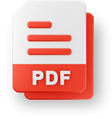
The History of Medical Education in Indonesia
- Prof. Dr. Menaldi Rasmin SpP(K), FISR, FCCP
-

The History of Medical Education at Gadjah Mada University
- Prof Dr dr Hardyanto Soebono Sp.D.V.E, Subsp.D.T
-

Academic Health System
- Prof dr Budi Mulyono SpPK(K), MM
-

Health, Health Services, and Medical Education in Indonesia
- Prof Dr dr Soenarto Sastro Wijoto SpTHT(K)
-

Medical Education In Teaching Hospitals
- Dr dr Slamet Riyadi Yuwono DTM&H, MARS
- How to publish in international journals. Workshop by Prof Pierce Salguero. Monday 23 June, 2pm. Free
- Excursion: Dinner at Ndalem Poenakawan and cultural performance at the Sonobudoyo museum at the kraton, Wednesday evening 25 June. US$25 EUR25; A$40.
- Tour of historical hospitals in and around Yogyakarta. Including: Petronella/Bethesda Protestant hospital (founded 1901), Dr. Yap Eye Hospital (founded 1923); Panti Rapih Catholic hospital (founded 1929); and the Dr Suradji Tirtonegoro Hospital in Klaten, where Indonesian medical education was continued during the Dutch military aggression (1946-1949). Expected fee: around US$30; EUR30; A$45 (for transportation).
Please inform Hans Pols by email whether you want to attend the workshop, come along to the excursion, and/or the historical hospital tour (hans.pols@sydney.edu.au).
There are several options to travel to Yogyakarta.
To speed up your entry to Indonesia, apply for your visa-on-arrival online: https://evisa.imigrasi.go.id/, and fill in your customs declaration form: https://ecd.beacukai.go.id/.
By plane
- If you fly to Singapore, you can connect with the one daily flight from Singapore to Yogyakarta (YIA) by Scoot, the budget airline operated by Singapore Airlines: https://www.flyscoot.com.
Singapore Changi airport: leaves 7.35, arrives 9:00 in Yogyakarta
Return flight leaves at 9:45, arrives at Singapore at 13.00.
- You can also fly to Jakarta or Bali, and take a domestic flight to Yogyakarta. There are four flights a day (with Garuda) from Jakarta; several other airlines fly this route.
The new airport in Yogyakarta is located some distance from the city. You can take a taxi (it might take 2 hours when the traffic is bad). Taking a Bluebird taxi is recommended (or a Silverbird if you want more space). Price: IDR 200,000 to 250,000.
The express train takes 25min to Yogya’s central station Tugu. Price: IDR20,000 to 50,000. Book at: https://reservation.railink.co.id/. It is essential to book ahead of time.
See also: https://yogyakarta-airport.co.id/en/public-transport/index.
There are several rideshare services. Uber did not make it in Indonesia, but there are equivalents: Gojek or Grab. Download the app ahead of time. There often are Gojek customer representatives dressed in green who will give you a special discount if you use their app (the app is called Gojek; if you use the app tap on “Gocar” otherwise you will end up on the back of a motorbike!). Gojek is a great way to get around Yogya.
By train from Jakarta to Yogya
If you fly to Jakarta, you can take a very comfortable and scenic train ride. Class “eksekutif” is the most luxurious one. Prices vary from IDR600,000 to IDR1,800,000 one way; travel time is 6 hours.
Travel from Jakarta Gambir (Central station at MONAS). Gambir is 1-2 hours from Jakarta airport by taxi (depending on traffic). The airport train is fast but does not go to Gambir.
From Yogyakarta Tugu Station to Gadjah Mada University or hotels
Take a taxi or a Gojek car. Taxi drives often offer rides for high fares; it should not cost more than IDR50,000. Bluebirds are reliable. Or leave the station and hail a cab on the street. Cab fares at stations are not regulated; elsewhere they are.
- If you fly to Singapore, you can connect with the one daily flight from Singapore to Yogyakarta (YIA) by Scoot, the budget airline operated by Singapore Airlines: https://www.flyscoot.com.
UGM University Club
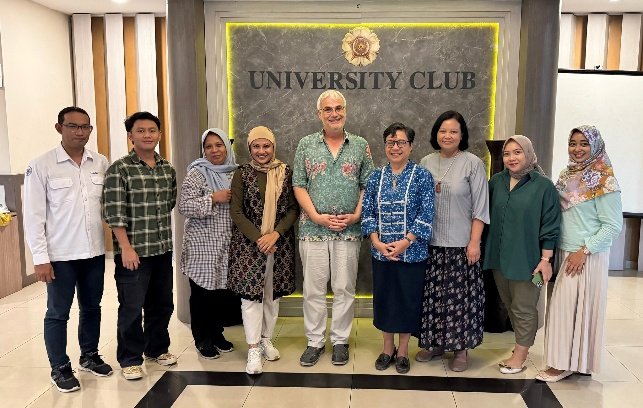
Accommodation at the University Club of Gadjah Mada University (UGM) is very affordable but also very basic. It is mere steps away from the conference venue.
You can book here: https://ugmclub.com/, go to “Book Now”, Check in: 22 or 23 June, check-out 27 June. Discount is only for the “Superior Room.” The promo code is 2025HOMSEA (No space between 2025 and HOMSEA).
The Superior room has two twin beds (so if you share the room, it is half the price!) and costs IDR420,000/night (A$24/night; roughly US$17/night). Breakfast for 2 is included.
One person needs to book the room; then you can share.
There is only a limited number of rooms. If they run out, let me know, we will book more!
Hyatt Regency Yogyakarta
https://www.hyatt.com/hyatt-regency/en-US/yogya-hyatt-regency-yogyakarta.
This hotel has a nice pool and a large garden. Several people attending HOMSEA will stay here. A taxi ride to the university takes about 20 minutes and will costs you around RP30,000.
Phoenix Hotel
https://all.accor.com/hotel/5451/index.en.shtml.
The front building of this hotel dates from colonial times. It is a short walk from Tugu station and Jalan Malioboro, where most tourists hang out.



